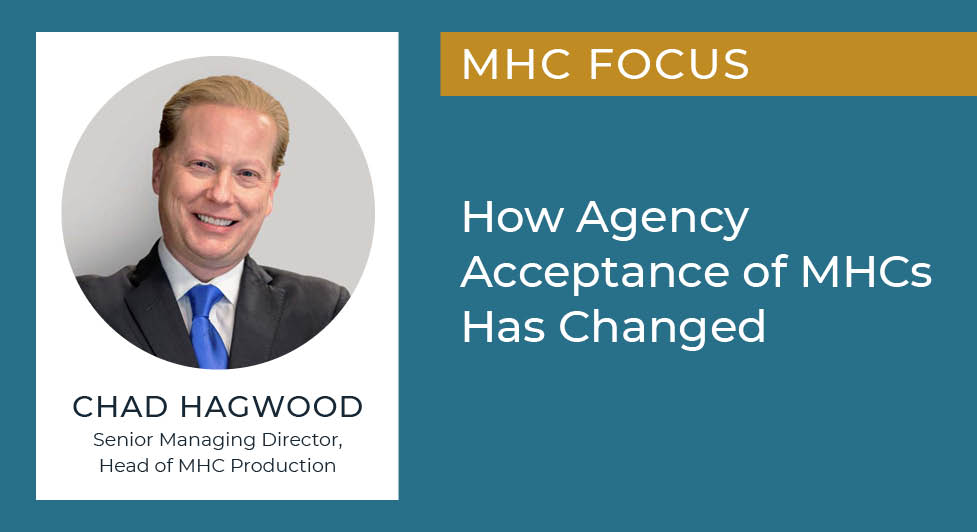This is the final installment of a six-part series on MHC insights and strategies by Chad Hagwood.
4 Fast MHC Facts:
1. The term “manufactured housing” was coined in the 1980s.
2. In 2016 Fannie financed its largest MHC deal to date with $1 billion backed by 120 MHCs.
3. Fannie started financing MHC assets in 2000.
4. Freddie launched its MHC financing program in 2014.
As manufactured housing community (MHC) owners navigate distinct market pressures—including the ongoing pullback among small and midsized banks—agency financing options have been playing an increasingly vital role.
Agency acceptance of MHCs has significantly evolved over the years. When the term “manufactured housing” was cemented in the 1980s, few lenders understood the business or how to structure debt to meet the needs of MHC owners. Fannie Mae and Freddie Mac did not enter the MHC market until decades later.
Today, the MHC financing arena is robust and highly competitive. With millions of Americans living in factory-built homes and the need for affordable housing steadily rising, the agencies have become an integral part of the business.
But there are key nuances when it comes to agency financing for MHC deals. Here’s a closer look at what MHC borrowers should know about the evolution of agency acceptance.
Finding the Right Fit with Fannie and Freddie
Fannie and Freddie offer several financing products for both seasoned and less experienced MHC owners today. These include small balance loans (SBL) under $2 million as well as larger agency debt products.
Fannie provided a total of $2.7 billion on MHC assets in 2022 and $1.2 billion through the first half of 2023, according to the agency. As of June 30th, 2023, Fannie held more than 1,800 MHC loans with a principal balance of nearly $21 billion. Still, these figures represent less than 5% of Fannie’s book of business, which signals the potential for future growth in its MHC lending.
By comparison, Freddie Mac’s totals in the same period are less than half, according to available data.
Agency MHC loans—which offer maximum loan-to-values of 80% and amortization periods of up to 30 years—start at the $1 million mark and can go into the hundreds of millions on marquee portfolio deals.
The agencies have made enormous strides since the early aughts, to say the least. Fannie started financing MHC assets in the late 1990s and officially rolled out its MHC program in 2000, getting a massive head start over Freddie, which launched its MHC financing program with a handful of experienced MHC originators in 2013. Before those years, the playing field looked very different. Just as the agencies were not accustomed to MHC lending, most MHC owners were not accustomed to the nuances of agency borrowing.
Today, Fannie and Freddie offer extremely reliable and highly competitive loan products with a high probability of execution and favorable interest rates. Their application processes have also been refined to save borrowers time and effort.
These changes, which continue to evolve to meet today’s market standards, open doors for mid-market and entrepreneurial MHC owners who might not be the right fit for pension funds, life insurance companies, and other institutional lenders.
Agency vs. CMBS Lending on MHC Assets
Commercial mortgage-backed securities (CMBS) loans are one of the main alternatives for MHC borrowers who want non-recourse permanent debt.
However, while agency lending has returned to more historically normal levels in recent years, the total volume of CMBS debt on MHCs has remained lower after spiking in 2021. A spike of more than $3.5 billion two years ago was largely driven by an affiliate of Brookfield Asset Management securing $2.2 billion to refinance a portfolio of 124 MHC assets in 13 states. Interest in CMBS loans has also waned from experienced, well-capitalized borrowers as rates are significantly higher. Many borrowers see CMBS programs as highly inflexible and costing two to three times as much to close over an agency loan.
Since then, CMBS conduits have financed just $34 million on MHC properties and portfolios in the first half of 2023 and less than $250 million in 2022, according to data from Commercial Mortgage Alert cited by Fannie Mae in September 2023 commentary.
The agencies have collectively financed more than $5 billion on MHC assets in the same 18-month period, which makes them a more viable option for mid-market owners.
Leverage Lument’s Expertise in Agency MHC Finance
Knowing the role that Fannie and Freddie play in the MHC market is an important part of understanding the MHC business and today’s competitive financing arena more broadly.
From SBL to larger agency loans, there are multiple solutions for MHC borrowers with the right amount of grit, strategic planning, and equity backing.
Lument’s originations team works closely with borrowers by offering expertise on agency financing and utilizing long-term relationships with Fannie and Freddie to close new MHC deals. Contact Lument to learn more.

